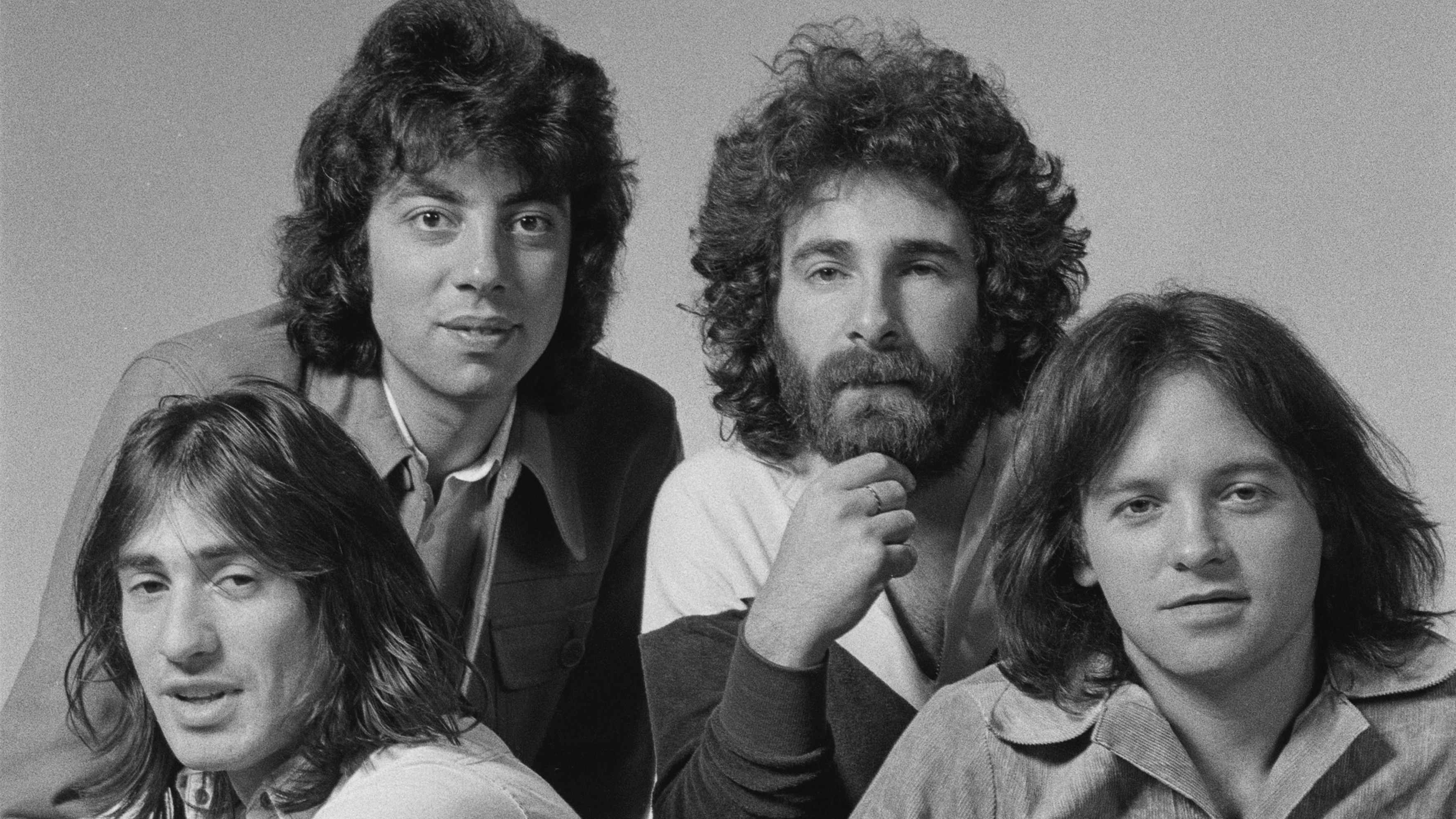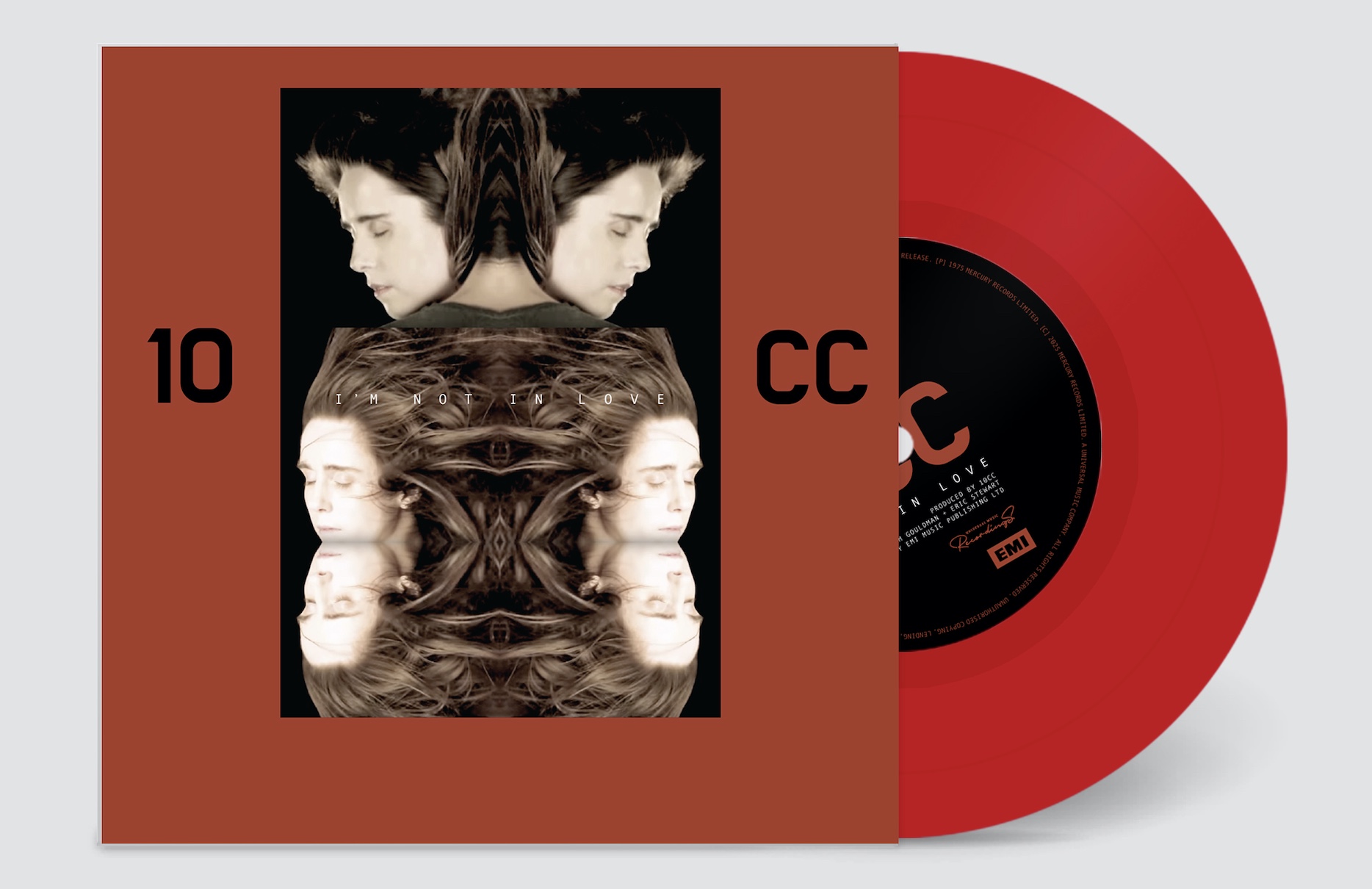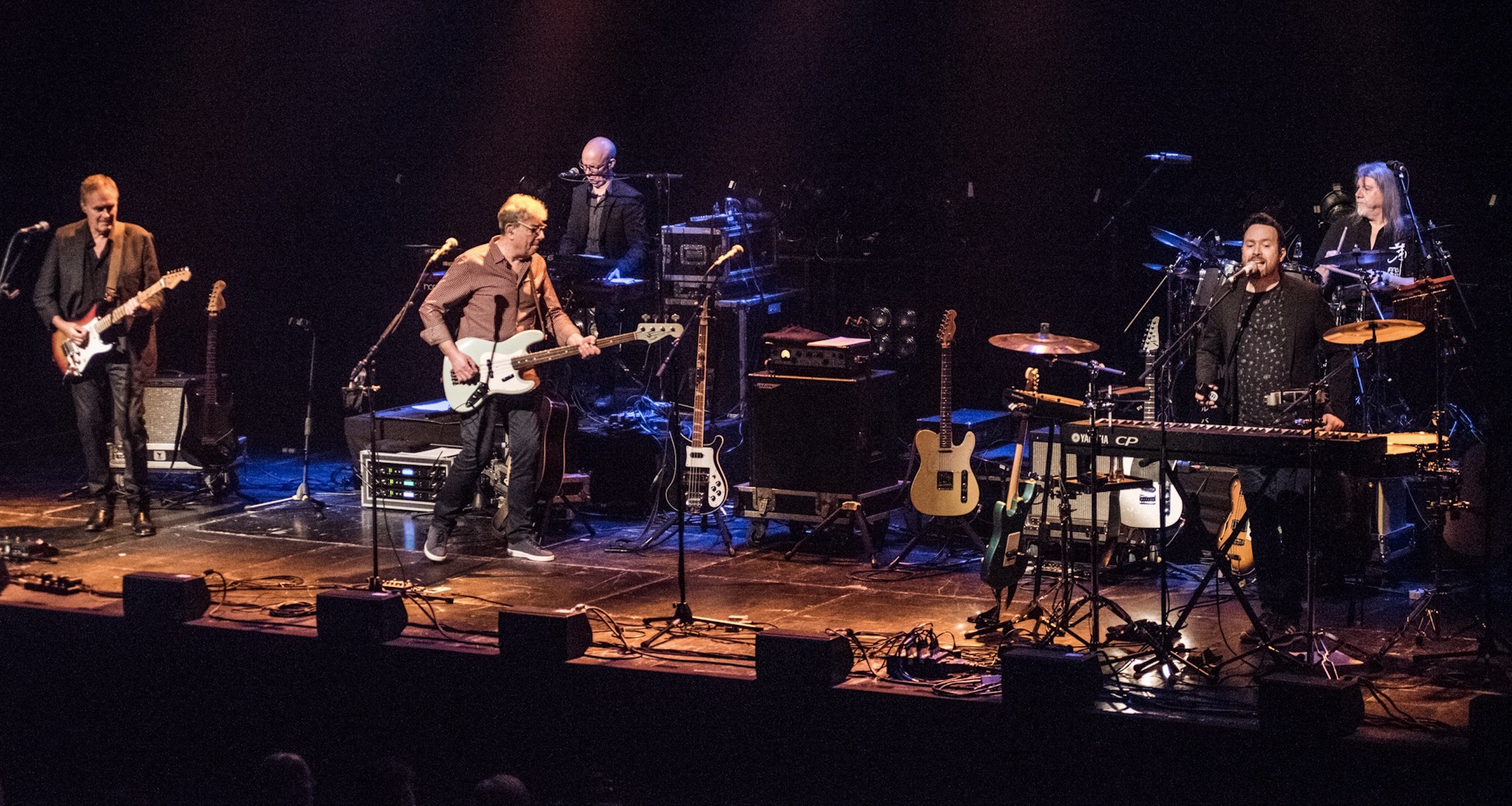"Does he love her, does he not love her? People play it at weddings, but it has that strangeness about it…": As it celebrates its 50th anniversary, 10cc's Graham Gouldman and Kevin Godley discuss the making of their classic anti-love song
We caught up with the band's Graham Gouldman and Kevin Godley for the inside track on one of the 20th century’s greatest but most unconventional ballads

I’m Not In Love by 10cc, one of the most memorable and enduring songs of the last century is – incredibly – 50 years old, and the song’s golden jubilee is a cause for multiple celebrations.
Firstly, the track is being re-released on special, limited edition 7” vinyl - especially for Valentine’s Day.
Secondly, band members Graham Gouldman and Kevin Godley have made an appearance in Radio 2’s Piano Room today, 13 February, to perform the song and two further tracks live.
And, thirdly, the duo have a new single out - their first new material in nearly 20 years. Don’t Want To Go To Heaven.
We caught up with Graham Gouldman and Kevin Godley as they prepared for their upcoming session to discuss I’m Not In Love and exactly what it takes to create a classic with 50 years of staying power.
You’ve got an important gig coming up – your Radio 2 Piano Room session. Are you all set?
Graham Gouldman: "We're sort of half rehearsed. We are getting together soon to do a proper rehearsal. We're doing I'm Not in Love, a new song Don't Want To Go To Heaven and - are we allowed to say what cover version we're doing? [quickly confers with the PR] No, we’re not! [laughs] [Turns out it was Natasha Bedingfield's Unwritten - Ed]
Want all the hottest music and gear news, reviews, deals, features and more, direct to your inbox? Sign up here.
And it’s the 50th anniversary of I'm Not In Love – a track that doesn't seem to have dated at all. Why is that, do you think?
Kevin Godley: "I think that's because it has a very individual sound. It’s a very individual record with a very individual identity somehow. It’s stood the test of time because of the identity of it and the song itself.
"Some songs are like that. It's very strange. The lyric is very ambiguous. Does he love her, does he not love her? It works in a similar way to The Police's Every Breath You Take. Another very negative song when you actually examine the lyrics but has the same effect. People play it at weddings, but it has that strangeness about it…"
The lyric does require a certain element of intelligence and trust. If you were to buy someone the new 7” release for Valentine's Day, for example?
GG: "Yeah, you’re relying on them to listen carefully to the lyric and understand it. But I think the actual record is imbued with something that you can't create. It just sort of happened. The combination of the song, the production of it, everything else… There's a few songs you hear that have that quality that's above and beyond just being music, lyrics and instrumentation. There's something more to it."
KG: "It's like it's blessed and it's haunted."

I think everyone listens to and talks about I’m Not In Love in isolation, but I feel like it was very much part of the experimentation of the Original Soundtrack album that carries it. That entire album is a collection of radical ideas and in that context I’m Not In Love is kind of less remarkable… Because all the tracks of that album were trying to ‘do something’. What were you aiming to achieve in those sessions?
GG: "I always thought we were like the errant children of The Beatles in a way. First of all, I don't think 10cc would have been together without The Beatles.
"They were our common influence. All four of us were influenced by them in one way or another, although we did all have different influences that we brought to the table and therefore created this wonderful chemistry between us.
"I don't think we were trying to achieve anything, were we? We were just ‘doing’."
KG: "We were pretty insular, I think at the time, when we made that album. We were lucky enough to have somewhere to record that was kind of ours. And we weren’t interrupted.
"We were out of London, so the sort of executive types couldn't come down and check in on us every lunch hour, so we were pretty much left to our own devices, and our devices were really about trying to improve on what we did last time - better songwriting, better recording, making something more interesting. And I think that was about it."
GG: "Yeah, and not listening to what was going on in the charts so much or being influenced by it. For me it was mainly about pleasing ourselves and pleasing each other. You had to be original, you know? You don't want someone to say, ‘Oh yeah, you're just like The Bay City Rollers…’"
KG: "We weren't easy to please."
GG: "And really you're trying to impress your bandmates, in a way."
And owning Strawberry Studios gave you the room to breathe?
GG: "Yes, the studio was started by Eric Stewart and a guy called Peter Tattersall, and then they moved to another premises and I became a partner in the studio. I thought it was a brilliant idea to have a proper studio outside of London and we all got together there.
"Kevin, Lol [Creme] and I were in different bands that used to rehearse at a club in North Manchester, and that's how we knew each other. Although Kevin and I were at school together, but you were in the year above, I think, Kev, weren't you?"
KG: "King's Road, yeah, right. Yeah, we were friends when we were kids and you were our mentor. We used to come and do demos at your house on the little Revox there."
And what sort of gear was in Strawberry Studios?
GG: "I think we were on 16-track right by that time. We had all the gear. It was all good stuff.
"I mean, we were lucky in that within the band, we had an engineer as well. A lot of the time we would record, just the four of us. If Eric was singing, one of us could work the board to record his vocals or drop in and out and things like that. So I think that was a very important element. And the fact that we were kind of isolated."
KG: "And I think because the first record we put out as 10cc, Donna, was a hit. That gave us a little bit of leverage to be able to carry on in that way. We kind of proved ourselves quite early on in the process, so that that was really helpful."
Kevin, you're famously on the record as not thinking much of I'm Not In Love first time around…
KG: "It sucked… Yeah, seriously."
GG: "I don't think any of us liked it. It didn't work."
KG: "It was a cheesy bossanova. It was almost like we couldn't think of what to do, so we just thought, ‘Let's lay something down, so we've got it’. Even if it's just a demo… And we'll kind of come back to it."
GG: "I can't remember what the attitude was at the time but we simply hadn't chosen a way to approach it that suited the material. It was as simple as that. We all felt it. We just didn't know what that something was until we tried it again."
But Lol Creme’s idea of constructing the track with just voices. Surely that must have seemed like an impossible task at that time?
KG: "Well, the word impossible didn't exist in the studio. It really didn't. If you had an idea of a sound or a way to approach something, there was always a way of doing it. It might take a month to do it…"
GG: "And it might not work, but we always tried. It was exciting."
KG: "I believe that, back then, because the resources were so slim, in terms of effects and in terms of creating new sound, that one had to have a lot of initiative in the way you thought and the way you approached things. You have to make things to do things, as opposed to buy things to do things, or just ‘press a button’ as you can today. It would be a lot easier and I'm Not In Love would have been recorded in two or three days.
"And another 20 odd people would have access to the same sound and could create something that sounded exactly like it because they could use that sound. Instead, we created something that was custom built for that piece of music."
I'm thinking that back in 1975 the Mellotron would have existed. So you were basically building your own Mellotron? With your own voices?
GG: "We did, yes. I mean, the actual mechanics of getting those voices and creating that choir was sort of using Mellotron technology in so much as we created loops of the notes that we wanted and they were mixed down, filling the 16-track recorder. And then mixing them to a stereo pair and then making a loop, so we had one note that had maybe 80 or 100 voices on that one loop.
"So we did borrow from that technology, but it was completely different. What we ended up with was all the notes that we wanted for the choir - let's call it the choir - they each came up on a fader on the board. And because we didn't have any more tracks, we had to mix those tracks down to a stereo pair.
"So we all actually physically played the board, going up and down with the faders and we did a few takes because some of them sometimes didn't feel right. You couldn't actually put your finger on it, but we thought ‘Let's do another take’ and then… We decided that this was it and we’d got it.
"It was really creative and very exciting to be present while this thing was growing, rather than simply hearing the whole thing finished in one go. Adding each voice… And hearing one voice next to the other and then trying to harmonise with them. It was fantastic."
So you knew that you were onto a winner while you were building it?
KG: "I think we knew that the sound of the vocals was going to work. But how it would dovetail with the other things we were going to do… You see, the original idea was for the thing just to be done with voices but we'd put down a backing track: Fender Rhodes, rhythm guitar, and a bass drum but whether that would stay, we didn’t know at that point. So all we knew was that while we were doing the vocals, it was sounding really promising."
GG: "But the weird thing was that rhythm track. Even that had some kind of magic to it. As Kevin said, the idea was initially that we'd have the rhythm track, do all the vocals, then take the rhythm track off. But as it grew, all the ideas became glued to one another, and worked beautifully."
KG: "I think it's because the backing track had lots of air in it, if you know what I mean? It was very sparse. So what we were trying to do was fill that air with something that sounded like air to a degree. And so it all began to make sense."
GG: "Eric played Fender Rhodes, and you played a Minimoog with a bass drum sound. It had some kind of magic. The song was somehow blessed right from the beginning."
I'm always fascinated by the choice of using a synthesizer for the kick drum. So there wasn't a kick drum around?
KG: "No, the reason we did that was because we felt, for some reason, that we should record the backing track and the guide vocal in the control room as opposed to the live area. And we knew it was just going to be a bass drum. Bringing the kit into the control room would kind of defeat the object. Everything was direct injection - microphones, keyboards, guitar, and the synth. It was all directly fed into the console. So that's why it’s not a real bass drum."
And ‘performing’ the choir, live via the desk. I'm thinking that you somebody must have screwed up their bit at some point?
GG: "If we did, we just did another take."
KG: "Imagine you've got a huge keyboard, but instead of doing that [mimes playing a keyboard] you're doing that [mimes moving a fader]."
And how many faders were you in charge of each?
KG: "A couple of handfuls."
GG: "Yeah, maybe four each. We were all at the console just going up and down. We all had our part."
KG: "We should have filmed it…"
It must have felt like a miracle when you went from start to finish and you knew you’d got it.
GG: "We knew we’d created something very special, but we didn't know of its commercial potential at all."
KG: "We didn't think like that. I personally don't have a good radar for a hit, but I know when I know when something is very good."
GG: "I’ve used the same method again, on my solo albums. I loved doing it and I really enjoyed remaking the loops, although it was all digital. But it wasn't the same because it was just my voice. On the original ones there's three of us, isn’t it Kev? Because Eric was engineering, so it's myself, Kevin and Lol that are that choir."
And I've got to ask about the break. "Big boys don't cry”. What’s that all about?
GG: "If memory serves, that was Lol’s idea: “Why don't we have someone saying ‘big boys don't cry’, but it's got to be a girl. And where is ‘a girl’? Oh, the secretary at the studio, Cathy Redfern. She got the job. And I think she got it really quickly as well. I mean like two or three takes. And there it was. And it worked great, obviously.
"But then every idea that we came up with worked because the song had something about it. It inspired great ideas. It just made everything, every production idea ‘work.'"
How do you feel about music technology today? Digital recording and sampling? Would you have liked to have had access to that kind of gear back then?
GG: "If we had then the record wouldn't have existed. At least not in that form.
"Had it been created today, and we’d had the same idea for the voices, first of all, the voices would all be in tune, which they aren't on the record. I'm not saying they're out of tune, but they're not perfect, and because of that they're, they're thick. They chorus. They have humanity because they are human."
KG: "They are AI - they’re ‘authentic intelligence’ as opposed to ‘artificial intelligence’.
"One thing that I've noticed - and it's not a complaint but an observation - but a lot of plugin effects being sold these days are sold because they’re a convenient way to do something. A quick way to do something. A way to write and record a hit without taking too much time out of your much more important day.
"It’s turning music into something you can do very quickly and efficiently, rather than offering you something that's been designed to make what you do better. It's become all about efficiency and speed, and I don't like that."
Something I've always wanted to ask. When Billy Joel released Just The Way You Are a couple of years later. The two songs are rather… Similar?
GG: "Yes, you're quite right!"
Did it make you smile? Were you annoyed?
GG: "I thought it was a compliment that he nicked our idea."
And you've just made a new track together. This is the first time you've played together for, what is it, 20 years?
GG: "Yeah, nearly 20 years. We put an album out called GG06 in 2006."
KG: "It was great fun - like slipping on a pair of old socks. It was a natural continuation of doing something. It wasn't like, ‘Oh shit, how am I gonna work with this guy?’ It just works because we do.
GG: "We recorded the bulk of it at Kevin's house and then I did stuff at my studio and sent it over and it was great. It was really enjoyable to do it. It makes me happy, you know? How could you not be happy, playing guitar on things?"

Doubtless you're both recording digitally into laptops these days.
KG: "Yeah, pretty much."
GG: "God bless GarageBand! But what matters is exactly the same thing that matters whatever the technology. It's got to be played right, it's got to be sung right, you know? The performance has got to be there and it's gotta be a good song.
"No amount of technology is gonna make you, or your song sound any better."
KG: "They do try though, don’t they?"
And any advice for aspiring writers looking to write a classic that's going to endure for 50 years?
KG: "Don't think about writing a hit. Don't even think about the money. Just think about writing something that's really good and represents what you believe in and what you want to say. And then just do it. Don't think about anything beyond that."
GG: "Yeah, amen to that. And try to be original. You know, it's easy to go, ‘Well, everyone's writing songs about this and that sort of works’ but just be yourself and write from the heart."
KG: "Don't do drum 'n' bass - do saxophone and piccolo!"
10cc’s I’m Not In Love 50th anniversary special edition 7” is available from 14 February. New track Don’t Want To Go To Heaven is available to stream from 13 February. And Graham Gouldman’s Heart Full of Songs tour begins in March.
Daniel Griffiths is a veteran journalist who has worked on some of the biggest entertainment, tech and home brands in the world. He's interviewed countless big names, and covered countless new releases in the fields of music, videogames, movies, tech, gadgets, home improvement, self build, interiors and garden design. He’s the ex-Editor of Future Music and ex-Group Editor-in-Chief of Electronic Musician, Guitarist, Guitar World, Computer Music and more. He renovates property and writes for MusicRadar.com.
You must confirm your public display name before commenting
Please logout and then login again, you will then be prompted to enter your display name.


